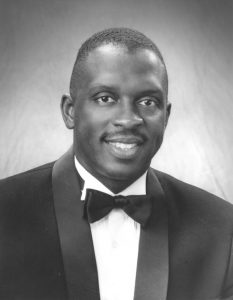Moses Hogan: A Bridge That Can Never Be Built Again
Words by Okara Imani
Just as Moses parted the Red Sea and ushered his people across treacherous terrain, so too did Moses Hogan usher into the unforgiving world of classical music, a Blackness so authentic that the feat literally could only be said to have happened once: spirituals in standard choral repertoire. Now, I’m not exactly well read up on that book, but certainly, the gravity does not escape me. Studying classically as a musician in places like Vienna, as Hogan did, one could fall easily into the patterns of the maestros about whom you’ve learned. It’s important, I think, to appreciate the implications of his educational career being notedly less of a Point A to Point B journey and more a hand-stitched quilt of experiences and lessons Hogan sought out for himself. That’s the gumption and know-how that has birthed and raised so many incredibly talented and well-loved Black musicians that burst into the national or global scene from their churches, schools, and communities. Scores of innovators, contemporaries, and creators begin their journeys — with or without reading or writing a score, learning by rote, keeping rhythm with hands and feet — in the cradle of Black American sound: the Negro Spiritual.
In that spirit, taking the tools garnered and foundational skills honed overseas — and at Julliard, for a time — Moses came back on to Nawlins, opted out of a doctorate, and got to the platforming and pathway clearing. And with his unique experience of post-secondary music education, Hogan and his personally founded choral ensembles, quite literally began harolding the thoughts, hopes, and voices of the Black experience in a way that no one had done so before in the classical arena; launching from the Euro-centric sacred texts in the art form and expounding upon the narrative of church and gospel music of his time. Gospel music or hymns are born from praise and worship in Anglo-Saxon religion, despite being sung and made famous in part by Black choirs and directors. While squeezed from the blood, sweat, and tears of African slaves, snatched from their homeland — but whose collective spirit was strong enough to birth an art form in a new and horrifying land — the Negro Spiritual is influenced by the impact of the white presence, while remaining wholly original and wholly of the diaspora, or ‘the people so dispersed.’

That being said, to truly appreciate and engage with some of your favorite classical music moments, such as were formed in the minds of those like Moses Hogan, I task you with an immersion excursion, to challenge you to an empathy exercise. Attend a program centered on some of Mozart, Ives, and Tchaikovsky’s Black contemporaries at your local theatre or concert hall, at your best and in your finest, so that those too may be well and properly attended and enjoyed to such a degree as to be programmed beyond Black History Month or Black Music Month. Visit a church in the Black community with one of those Black friends — you may have invoked in conflict or in casual conversation — and be awash with the intensely juxtaposed grief and relief, anguish and joy, fury and freedom. See it pouring from the congregation and know that it flows from such deep roots that teem with love, pride, and glory that it can be felt even from within the confines of the Anglo-Saxon hymnals that house it.
And so to say that Moses Hogan, much to the benefit and delight of the classical community, built a bridge for the Black chorus that can never be built again — this is both a defining statement and an utterance of hope. Hope we never cross this particular bridge in the future, lest it be on a pathway out of another dark, dark time of slavery and subjugation. Hope that there be no “new” spiritual, else we’ll have torn fresh and weeping wounds into this nation. And when that dark matter flows and overflows, new bridges are built, and once again part the sea of despair, that we may sing our way through the dark and into the light of true freedom.
Listen to this episode of the Melanated Moments in Classical Music podcast.






Leave a Reply